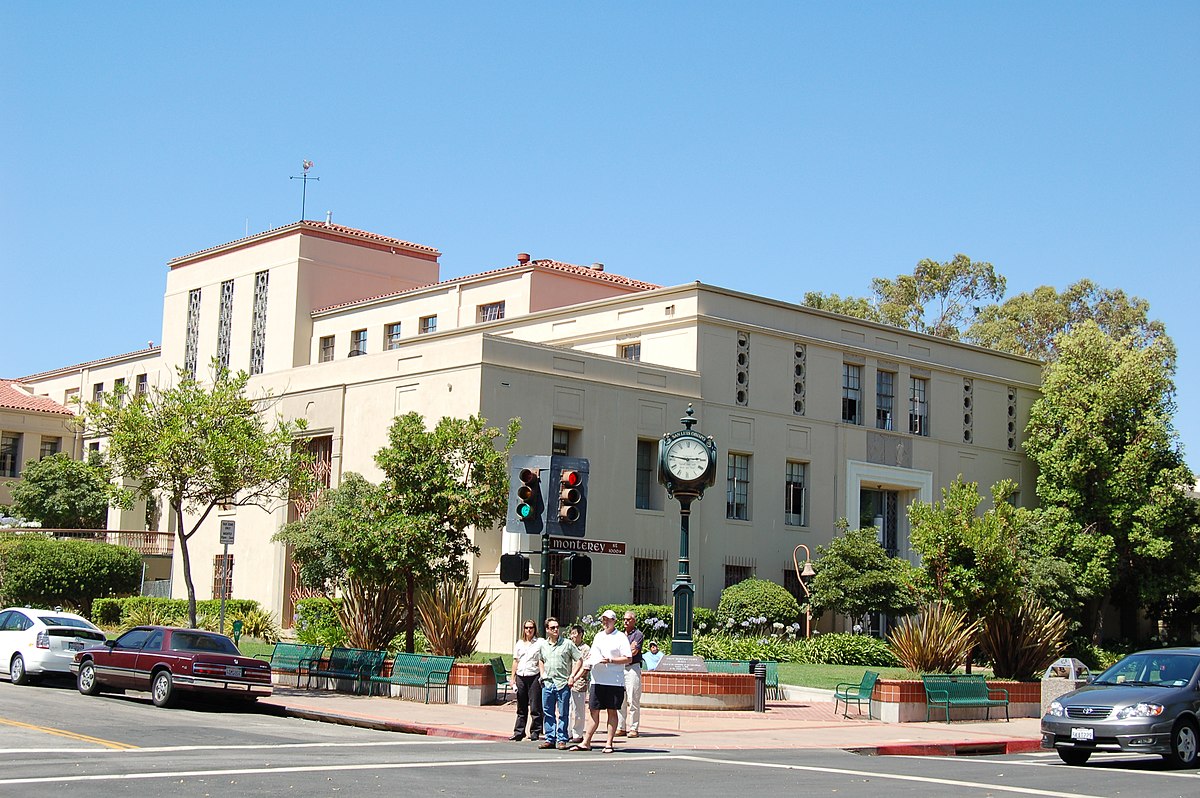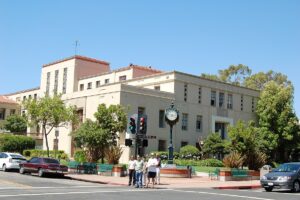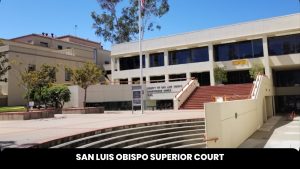San Luis Obispo County Superior Court – Criminal Branch
address
1050 Monterey Street, Room 220
San Luis Obispo, CA 93408
Phone
805-781-5670
Phone Hours
Monday – Friday: 8:30 am-4:00 pm
Counter Hours
Monday – Friday: 8:30 am-12:00 pm
Overview of the San Luis Obispo County Superior Court Criminal Branch
The Criminal Operations Clerk’s office can be contacted by email at [email protected] or by calling (805) 706-3600 and selecting option 3.
This courthouse handles all felony and misdemeanor criminal cases arising in San Luis Obispo County. Cases range from minor infractions to serious violent crimes. Defendants have the right to a speedy and public trial by judge or jury.
Types of Cases Handled
The Criminal Branch handles:
- Non-traffic infractions
- Misdemeanor criminal matters
- Felony criminal matters
Part of the California Superior Courts System
The San Luis Obispo County Superior Court is one of 58 trial courts in California. In trial courts, a judge and sometimes a jury hears witnesses’ testimony and other evidence and decides cases by applying the law to the facts of the case.
Staff and Departments of the Criminal Branch
Judges
The judges presiding over criminal cases are appointed by the Governor and confirmed by the Commission on Judicial Appointments. They are responsible for conducting trials, accepting or rejecting plea agreements, issuing sentences, and ensuring fair proceedings.
District Attorney’s Office
The District Attorney’s Office represents the people of the state of California in criminal matters. The prosecutors review reports and evidence, file charges, negotiate plea bargains, and litigate cases.
Public Defender’s Office
The Public Defender’s Office provides legal representation to defendants who cannot afford private attorneys. The public defenders advocate for the rights of the accused.
Court Clerks
Court clerks assist the judges and attorneys by maintaining records, coordinating witnesses, providing certified copies of documents, administering oaths, and enforcing court rules.
Bailiffs
Bailiffs are law enforcement officers who maintain security and order in the courtroom. They escort defendants to and from court and enforce court decorum.
Criminal Case Process and Procedures
Felony Cases
For serious criminal offenses, the process begins with an arrest and the filing of a complaint by the prosecutor. There is an arraignment, preliminary hearing, pre-trial motions, and finally a trial by jury. Defendants have the right to an attorney and to present a defense.
Misdemeanor Cases
Misdemeanor cases involve minor offenses punished by fines or jail time under one year. There is generally an arraignment and pre-trial hearing. Defendants can plead guilty or go to trial before a judge.
Traffic Cases
Traffic cases involve infractions like speeding tickets. Defendants can pay fines, request traffic school, or contest the ticket at trial. DUI cases go through the misdemeanor process.
Sentencing
If found guilty, defendants receive jail time, probation, community service, fines, or diversion programs. The judge determines the sentence based on the law and the facts of the case.
Court Services and Resources
Self-Help Center
The Self-Help Center provides information and resources for defendants representing themselves without an attorney. They have workshops, sample forms, and assistance completing paperwork.
Mediation
Mediation programs allow parties to resolve minor criminal cases through discussion, avoiding a trial. Trained mediators facilitate mutually agreeable resolutions between defendants and prosecutors.
Probation Department
The Probation Department oversees compliance with probation terms, including meetings with probation officers, drug testing, community service, classes, and other conditions.
Victim Services
Victim advocates provide information on cases, accompany victims through the process, help complete paperwork, refer counseling services, and assist in applying for compensation.
Navigating the Criminal Justice System
Understanding Your Charges and Penalties
Make sure you understand the exact violations you are charged with and the potential penalties if convicted. Consult with your attorney so you know what to expect.
Working with Your Attorney
Be honest and upfront with your attorney so they can build the best defense. Follow their advice closely throughout the process. Ask questions if you don’t understand.
Courtroom Conduct and Etiquette
Address the judge as “Your Honor”. Dress appropriately and remain quiet and respectful. Do not speak unless asked a direct question. Turn off phones and electronic devices.
Resolving Your Case
Consult with your attorney to determine if a plea deal or alternative resolution makes sense for your case. Do not accept any deal until you understand the consequences.
Online Court Resources
The San Luis Obispo Superior Court website provides the following helpful online resources for criminal cases:
Search Court Records
The court does not offer online access to criminal case records. However, the website provides instructions for obtaining records directly from the courthouse by mail or in person. Records can also be searched onsite using public computer terminals.
Dockets, Calendars, and Case Information
Current daily court calendars allow you to look up scheduled cases by case type or department. The probate calendar can also be viewed online. In addition, civil and probate tentative rulings are published online by judge’s name.
Opinions and Orders
Legal opinions issued by the California Attorney General from 1985 to present can be searched online. However, specific orders and opinions from the San Luis Obispo criminal court are not available electronically.
Forms and Information
Various San Luis Obispo Superior Court forms, such as fee waiver applications, can be downloaded from the website. General state court forms are also available, along with interactive forms that help you prepare documents tailored to your situation.
Online Payments
The website allows online payment of criminal, traffic, and family fines owed to the court. Payments can also be made for parking tickets issued in various San Luis Obispo cities.
Self-Help Resources
The court provides a Virtual Self-Help Center with information on traffic cases, criminal law, restraining orders, and other topics. Links to legal research, family services, small claims advisors, local rules, and mediation services assist self-represented parties.
Legal Aid and Lawyer Referral
Contact information is provided for San Luis Obispo legal aid organizations and the county lawyer referral service. Seniors can also learn about special legal assistance programs.
Using the San Luis Obispo Criminal Court
The San Luis Obispo courthouse conducts arraignments, preliminary hearings, motions, trials, sentencing and other proceedings for criminal cases. Here is an overview of navigating this court:
The Courthouse and Staff
The felony criminal department is located on the 2nd floor of the courthouse. Misdemeanors are heard on the 1st floor. Security checks are conducted at the entrance. The public counter can provide forms and answer basic questions. Each department has a courtroom clerk who can advise on scheduling, filings and other procedural matters.
Locating Criminal Case Information
Case records can be searched in person using public access terminals onsite. Register of actions and future hearing dates can also be obtained from the courtroom clerk. Records cannot be accessed online. Filing fees apply for record copies.
Understanding the Criminal Process
The key stages of a criminal case include:
Arrest and Booking
The police arrest suspected criminals and book them at the county jail. Bail may be set at this stage.
Arraignment
The defendant appears in court, hears charges and enters a plea. The judge considers bail.
Pretrial Activities
The prosecution and defense exchange information through discovery. Pretrial motions may be filed and heard by the court.
Trial
The case can be tried before a jury or judge. Witnesses testify and evidence is presented. The verdict could be guilty or not guilty.
Sentencing
If found guilty, the judge imposes a sentence like probation, fines, classes or jail time. Serious felonies can draw prison terms.
Help for Defendants
Those facing criminal charges have assistance options:
Obtaining a Public Defender
Defendants who cannot afford a lawyer may ask the judge to appoint the public defender’s office for legal representation at no cost. Financial eligibility requirements must be met.
Alternatives to Incarceration
For certain offenses, programs like drug rehab, community service and counseling allow defendants to avoid jail time. Veteran’s Court and Mental Health Court connect qualifying individuals with specialized resources and treatment.
Paying Fines and Fees
The court’s website allows online payment of criminal and traffic fines. Fees can also be paid in person at the courthouse or by mail. Failure to pay can result in additional penalties and collection actions.
Online Resources for Criminal Cases
The San Luis Obispo Superior Court offers these digital services to assist parties with criminal matters:
Electronic Filing and Service
Authorized legal professionals can electronically file documents in criminal cases using the court’s online portal. Electronic service on other parties is also available.
Remote Appearances
Many routine proceedings allow parties and attorneys to appear by phone or videoconference rather than in person. Requirements are listed by case type.
Searching Court Records
While records cannot be accessed online, public computers at the courthouse allow searching Superior Court databases for information on cases, calendars, rulings and documents filed.
Calendars and Dockets
Upcoming court calendars and case dockets can be viewed online by date, department or case type. Tentative rulings are also published on the website.
Court Forms
Blank forms required for criminal proceedings, such as fee waiver applications, can be downloaded from the website. Interactive interviews help customize forms.
Virtual Self-Help Center
The self-help center provides a wealth of information online related to traffic infractions, restraining orders, expungement, diversion, warrants, and other criminal matters.
Online Payments
Fines owed to the court can be paid online, avoiding long lines at the courthouse. Debit/credit cards or eChecks are accepted.
Conclusion
The Criminal Branch of the San Luis Obispo County Superior Court handles a high volume of cases every year. Understanding the people, procedures, and resources available at the court can help you effectively navigate the system if you are facing criminal charges. With proper legal counsel and conduct, you can work towards the best resolution for your individual situation.
Frequently Asked Questions
1. What are the business hours for the San Luis Obispo Criminal Courthouse?
The courthouse is open 8am to 5pm, Monday through Friday, excluding holidays. Certain departments may be open extended hours. Call ahead for schedule details.
2. Can I resolve a bench warrant without getting arrested?
Yes, you may be able to recall or quash your warrant without being taken into custody. Call the court clerk or speak with an attorney to discuss your options.
3. How can I get a copy of a record from my criminal case?
You can request copies of documents filed in your case in person at the courthouse records office or by mailing in a request with the case details and a records request form. Fees apply.
4. What agencies in the county offer bail bonds?
Several licensed bail bond companies serve the San Luis Obispo area. The court website provides a list of authorized bond agents you can contact for assistance with posting bail.
5. If I’m found guilty, can I do community service instead of paying my fine?
Potentially, yes. Speak with your attorney or the court clerk about whether you qualify for community service as an alternative sentence option to satisfy your fines. Certain conditions apply.
What are the main differences between felony and misdemeanor cases?
Felonies are more serious crimes with penalties over one year in prison. Misdemeanors are minor offenses with jail time under one year or fines. The processes are similar but felony cases require more formal procedures.
What should I do if I receive a traffic ticket?
Review the options on the back of the ticket. You can pay the fine, request traffic school, or plead not guilty and go to court to contest it. If it is a DUI, contact a criminal defense attorney.
How can I look up details about a criminal case?
Contact the criminal court clerk’s office to ask about accessing public records. Some courts also provide online case information searches. Information may be limited for pending cases.
What happens at a sentencing hearing?
The judge will review sentencing recommendations and allow the defense and prosecution to address aggravating or mitigating factors. The judge will then issue the final sentence within the parameters set by law.
What resources does the self-help center provide?
Workshops, sample forms and documents, guidance on the process, referrals to legal aid, and assistance completing required paperwork. Staff cannot provide legal advice.





